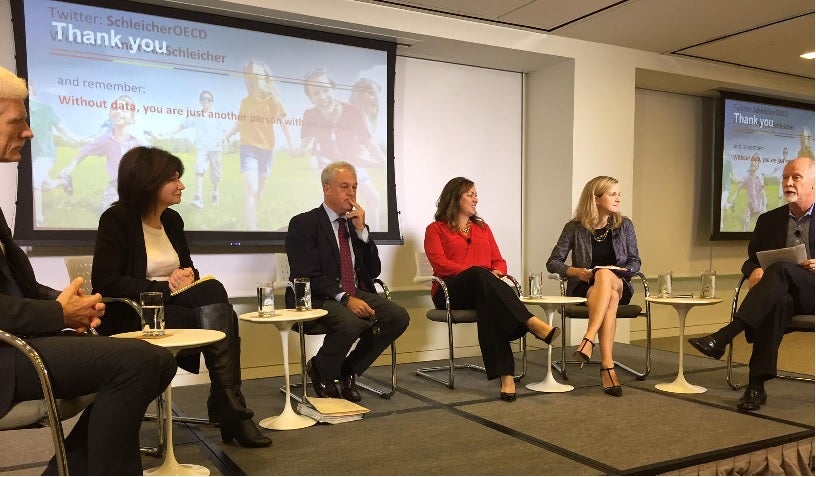FutureEd Hosts Building a 21st Century School System
If you’ve heard that U.S. students lag behind their peers in other countries, it’s because Andreas Schleicher created the test that assesses performance for 15-year-old students across the globe. On Sept. 18, the McCourt School’s FutureEd hosted Schleicher and a panel of American education leaders to consider the lessons he’s learned internationally.

If you’ve heard that U.S. students lag behind their peers in other countries, it’s because Andreas Schleicher created the test that assesses performance for 15-year-old students across the globe. On Sept. 18, the McCourt School’s FutureEd hosted Schleicher and a panel of American education leaders to consider the lessons he’s learned internationally.
Schleicher, who is director of education and skills at the Organization for Economic Co-operation and Development in Paris, provided data from several years of testing to show that the most successful school systems often provide less classroom time but more time for teacher planning. They focus less on memorization and more on building critical thinking skills. And they set strong, consistent standards while still providing for local autonomy.
“I think local autonomy, without a strong, shared notion of what good learning outcomes is about, is not going to get you very far,” he said.
Panel member Chris Cerf, the former schools superintendent in Newark, N.J., agreed and stressed that devolving autonomy to the local school and teachers “highly depends on the capacity of the teacher.”
Schleicher faced some pushback from panel member Lily Eskelsen Garcia, president of the National Education Association, the nation’s largest teachers’ union. She decried the emphasis on standardized tests that forces teachers to focus on memorization rather than the needs of the whole child. She argued that teachers and their unions should be at the center of the effort to professionalize teaching.
Another panelist, former New Mexico education secretary Hanna Skandera, described her own efforts to engage teachers in improving instruction and compensation. Claire Voorhees, national policy director for the Foundation for Excellence in Education, said each level of government should play its proper role. “History has proven that the federal government is not good nor should it be setting standards or curriculum or getting down into classrooms,” she said.
FutureEd Director Thomas Toch moderated the panel. You can view the discussion here or read excerpts from Schleicher’s book focused on digitized learning and teacher professionalism.
- Tagged
- McCourt Centers